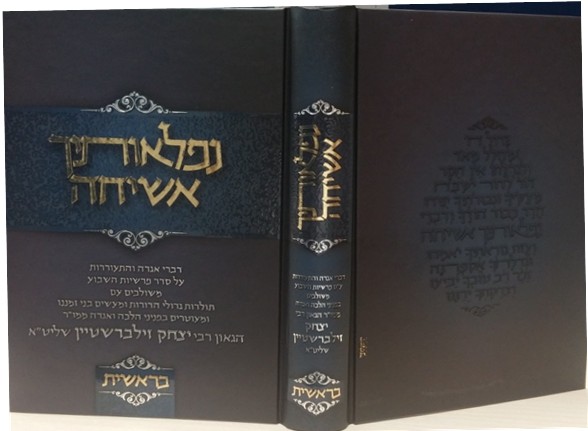Starting from Genesis: "Thanks to Dad's Strengthening, We All Strengthened"
Rabbi Eliyahu Nachum grew up in a traditional family, but after his children grew up, he decided to strengthen his faith, finding all his fulfillment in Torah study. Just days before his books 'Niflaosecha Asicha' were published, he passed away. In an emotional conversation, his sons speak about the unique figure behind the books.

The series 'Niflaosecha Asicha' on the Five Books of the Torah is familiar to many, but the modest man behind them is not known to everyone. This is about a Jew named Rabbi Eliyahu Nachum of blessed memory, who was born on Simchat Torah in 1946 in Benghazi, Libya.
Rabbi Nachum's life story is nothing short of fascinating, and when we hear it from his children, it is hard not to be moved. "Dad came to Israel with his family right after the riots started in Libya," the sons recount. "In Israel, he was educated in a religious school, and the home he built was traditional-religious. We, the children, were raised in a religious environment, but after our grandfather passed away, Dad began strengthening his faith and approached Judaism rapidly."
According to them, this led their father to connect with various outreach organizations. After enrolling the whole family in a Judaism seminar, they all underwent a great spiritual transformation. Shortly after, the family moved to the Kiryat Ben Gurion neighborhood in Holon, where Rabbi Nachum became the driving spiritual force in the neighborhood.

Study, Study, and Study
For decades, Rabbi Nachum organized Torah classes, mainly held at his home. Additionally, he initiated and built three synagogue buildings in the neighborhood. He didn't stop there and in his later years, he established another synagogue – 'Meir Einayim', where a mikvah purity and a yeshiva for young men were established, with classes running from early morning until late at night. Many of these activities were aimed at boys gathered from the streets, and regular events such as the joy of Shabbat, Selichot assemblies, and more were held.
His sons recall his daily schedule: "It included waking up before dawn, ritual immersion, and starting from 2:15 AM, studying in the synagogue and holding a class until the sunrise prayer. After prayers, he would study, return home for breakfast, and then leave at 9:00 AM to the yeshiva until 4:00 PM. Afterward, he would return to the synagogue to participate in several classes until the evening. For the last thirteen years, our father went to Rabbi Yitzchak Zilberstein's yeshiva in Bnei Brak, being a full-time scholar for all the yeshiva's sessions, including delivering Torah lessons that amazed the audience. He did this until his very last day."
At his funeral, everyone was moved when Rabbi Yitzchak Zilberstein spoke in his praise and said: "We are now accompanying Rabbi Eliyahu Nachum of blessed memory to his rest. He left all worldly pleasures to come study Torah with us diligently and with immense love. When he gave lessons at the yeshiva, it was a day of joy. Not everyone merits this, he was a shining diamond."
Did Not See the Books
For nearly two decades, Rabbi Eliyahu worked, labored, collected, and compiled many interesting Torah teachings to engage a large and diverse audience and deliver them in his numerous classes. To enrich his teachings, he always sought fascinating and rare stories. Anyone who had the chance to speak with him was always asked if they had an interesting story to "sell" him. Upon hearing a suitable story, he would immediately seek the source and note it in his notebook.
Rabbi Nachum integrated these Torah teachings with special stories of great sages throughout the ages into his series on the Five Books of the Torah 'Niflaosecha Asicha'. The book was eventually printed in thousands of copies in Israel and worldwide and is studied in many homes, from the tables of great rabbis to many homes in Israel. Each book includes about 500 pages of special Torah teachings along with stories, facts, customs, and wonderful stories about the great figures of Israel, arranged according to the weekly portions.
However, sadly, Rabbi Nachum did not live to see his books 'Niflaosecha Asicha' come to light, after laboring over them for so many years. He passed away just days before the first volume was released.
"He did not see the book in this world," expressed Rabbi Zilberstein at his funeral, "but in heaven, they will show him the book. There it will not be bound in paper, with a fancy cover; there they will show him the book with golden letters. There, the book will be written differently; they will show him the book on which he worked and sweated greatly."
Excerpts from the Book
In these days before Shabbat Bereshit, it seems an appropriate time to present two fascinating examples from the book related to the current week's portion:
A Dispute for Heaven's Sake
And God called the firmament Heaven. And there was evening, and there was morning, a second day. (Genesis 1:8)
And God called the firmament Heaven. The Lord did not want it to be called by the name firmament, as this name indicates separation and dispute, from the word and they hammered [רקעו] sheets of gold. As each firmament is a screen dividing between two things. This is why "it was good" is not mentioned on the second day, because on it dispute was created, as there is no goodness except where there is unity. Therefore, "it was good" is mentioned twice on the third day: one for the work of the third day and one for the completion of the water's task which has an aspect of unity, as it says, "Let the waters gather... into one place," and because of this unity, "it was good" is mentioned. But on the second day, from which all change and dispute originate, "it was good" is not mentioned. (Kli Yakar)
Here is a story of a dispute that brought great pleasure in heaven, and may such "disputes" multiply in Israel.
Our teacher, the great rabbi Rabbi Yitzchak Zilberstein says:
The great rabbi, Rabbi Ezra Attiya, of blessed memory, served as the head of the Porat Yosef Yeshiva for about 45 years. After he passed away, there were two possible candidates worthy of assuming this role in his stead: Rabbi Yehuda Tzadkah and Rabbi Tzion Abba Shaul.
Contrary to what is typical, where each candidate believes he is the most suitable for the role, here the opposite occurred: each rabbi insisted that his colleague was more suited for the role than himself, and therefore he was not willing to take on the role under any circumstances.
This "dispute" continued for quite some time, each of the great rabbis stubbornly declaring that the other was more suitable for the role.
Until one day, the argument was resolved. It happened when Rabbi Tzion Abba Shaul approached Rabbi Yehuda Tzadkah and asked, "Why doesn't the Rabbi agree to be the head of the yeshiva?"
"Because you are more suitable," answered Rabbi Yehuda Tzadkah.
"Why do you think I am more suitable?" Rabbi Tzion Abba Shaul inquired.
Rabbi Yehuda Tzadkah replied, "Besides being an enormous scholar, you are also a judge."...
"If so," Rabbi Tzion Abba Shaul concluded, "I hereby judge that you should be the head of the Porat Yosef Yeshiva, and you must listen to me, as I am the judge."
And so it was. Rabbi Yehuda Tzadkah assumed the leadership of the yeshiva. But Heaven arranged things, possibly due to Rabbi Tzion's humble concession of the esteemed position, that after Rabbi Tzadkah’s passing, he would be appointed as his successor. Thus, in the end, both rabbis merited to lead the Porat Yosef Yeshiva.
The Eruv that Protected
And on the seventh day God completed His work that He had done, and He rested on the seventh day from all His work that He had done. (Genesis 2:2)
It is a sign between Me and the children of Israel for all time, that in six days the Lord made heaven and earth, and on the seventh day He ceased work and was refreshed. (Exodus 31:17)
And here is a story that occurred in our generation about how Shabbat protected an entire area from a fire, may heaven save us.
The great rabbi Avraham Moshe Katzenelson of blessed memory, rabbi of the Nayot neighborhood in Jerusalem and responsible for supervising the eruvin in Jerusalem and its suburbs, shares:
Following the massive fire that occurred in 1993 in the Jerusalem hills forests, where thousands of trees were burnt along the corridor to the village of Shoresh, the residents urgently summoned us to come and repair the eruv in the wake of the fire.
Initially, I assumed that Torah scholars or at least a group of religiously observant people lived in the area, explaining the urgency for a properly established eruv. But to my great surprise, I found no individuals connected to religion at all... So, what prompted the urgent need to repair the eruv in their area?
To everyone's surprise, it turned out to be truly astounding. All places that were within the eruv in the village were untouched by the great fire and were not damaged by the flames that consumed entire homes like straw. The residents visibly understood this as a "merit" or a form of "protection" for them, that the eruv being intact as required in their settlement guarded and protected them from the fire, and thus they urgently summoned us.
As it is said (Exodus 31:16) "And the children of Israel shall observe the Shabbat." And the sages have said, more than Israel has kept the Shabbat, the Shabbat has kept Israel.
The Merit of Forgiveness
Rabbi Nachum's sons cannot help but mention their father's many merits. A student and close person to him told of how a week before his passing, Rabbi Nachum called him and asked him to organize a minyan of ten people to go to the cemetery where a certain Jew was buried and ask for his forgiveness. Rabbi Nachum noted that the deceased had once told him that he does not forgive him for a particular matter, and although this seemed unnecessary, Rabbi Nachum wanted to ask for his forgiveness.
The individual whom the request was addressed tried to postpone its performance, explaining that he did not know how to find the grave and also found it impossible to bring ten men to the cemetery, especially since it was the eve of Rosh Hashanah. But Rabbi Nachum did not give up; he said: "I will cover all travel expenses, just please go and ask for forgiveness on my behalf. I am not willing to leave this world without knowing that the matter is settled."
Afterward, he even began to cry: "I beg you to do this today, today, finish it even tonight."
Indeed, that night a group of yeshiva students went to the site, and in the morning, when they called to inform Rabbi Nachum that the matter was taken care of, it turned out he was too weak to respond. The next day he passed away.
"Father was fortunate to be reminded from Heaven just before his passing that there was someone he needed to appease in the world. This is a tremendous merit," his children conclude, "because when a person devotes his entire life to Torah, it is evident that in his final moments, Heaven allows him to remember his obligations to ascend pure."

